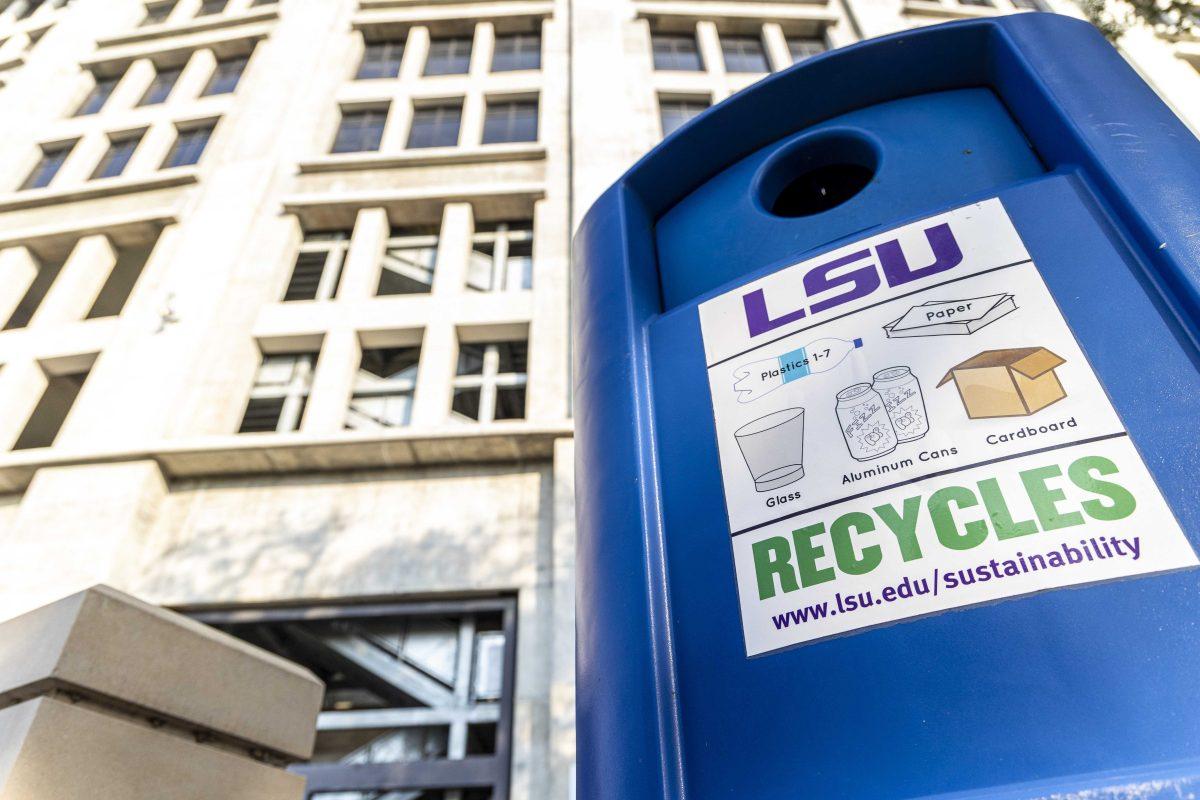A truck of recyclables was contaminated with trash during the LSU versus Alabama game on Nov. 5 at the National GameDay Recycling Challenge due to a miscommunication, according to campus sustainability.
The GameDay Recycling Challenge is a nationwide competition between colleges and universities aimed toward recycling and reducing the waste generated at home football games. LSU has won the championship twice before, once in 2016 and again in 2019.
Campus sustainability was expecting the LSU versus Alabama game to be a great opportunity for picking up trash and recycling due to the large number of people at the game, collecting close to 70 tons of trash, Tammy Millican, the executive director of facility and property oversight, said.
Although there was one truck of collected recyclables, Millican said there was one other truck where the recyclables and the trash were accidentally mixed together, contaminating the recyclables.
According to Millican, Facility Services realized it as soon as it happened. She said she isn’t sure exactly who made the mistake but believes it had been some staff members overwhelmed by the amount of trash produced that day.
“It has to be some of our staff – that’s who’s getting the materials and getting it into the truck or they have it lined up so it can be picked up,” Millican said. “We’re not entirely sure, but we’ve talked to all of our staff, and everybody is aware.”
Landscape services has a mandate that campus must be clean by the Sunday morning following the game, she said. The staff is constantly working, Millican said, not only emptying containers, but picking trash from the ground because when staff leaves campus on Sunday. It has to look like there was never a football game, she said.
“We are disappointed that that truck did get mixed, but more disappointed that our students had that experience when they came out here to help us, so it has been a huge learning lesson for us and a catalyst for us to start looking at even more improved ways of removing the recyclables from campus,” Millican said.
Jeffrey Brocato, assistant director of landscape services, said the group collected almost 66 tons of trash and nearly four tons of recyclables that day. On average, they collect around 42 tons of trash for football games, he said.
“If we have to divert some of our funding that we currently have for gameday – if some of that has to be diverted to help out with recycling– we’ll do what it takes,” Brocato said. “Recycling is a high priority for us, and whatever it takes, we’ll find a way.”
He said they are planning for ways to prevent this from happening next football season.
“Moving forward, next season I think it would benefit us to have one crew that handles just the trash and one crew that handles just the recyclables,” he said. “That way there’s no confusion on what’s going where.”
He and Millican said they hope this is an opportunity to “change the culture” and encourage more recycling. Brocato said they placed about 1,000 recycling bins and about 4,000 trash cans around campus, with next year providing the opportunity to increase the number of recycling bins.
“I think there is an opportunity for us to get more of that recyclable material out of the trash and into the recycling cans,” Brocato said. “Decrease the amount of trash and increase the amount of recycling.”
Millican said she wants to find funding through grants to expand campus sustainability, adding that she plans to speak to LSU Athletics to see what kind of funding they can provide.
International studies senior Emily Clarke is the director of Geaux Green, an environmental sustainability club at LSU. Clarke was among the student volunteers that participated in the GameDay Recycling Challenge. The result was disappointing, she said.
“Students came to volunteer and dedicated time to making the project succeed, and so did Campus Sustainability,” Clarke said. “However, this project is a part of a larger campaign to implement recycling and sustainable waste management during athletics events, so it was impactful for us to interact with people and share our goals despite the end results.”
Despite the issues the challenge presented, Clarke said that she is thankful for the effort from students and Campus Sustainability and their participation in the GameDay Challenge.
“Although the outcomes were not as intended and we are disappointed in the results, this year was an important step in restarting our participation in the GameDay Recycling Challenge, communicating with athletics about implementing recycling and promoting sustainable practices overall,” she said.





